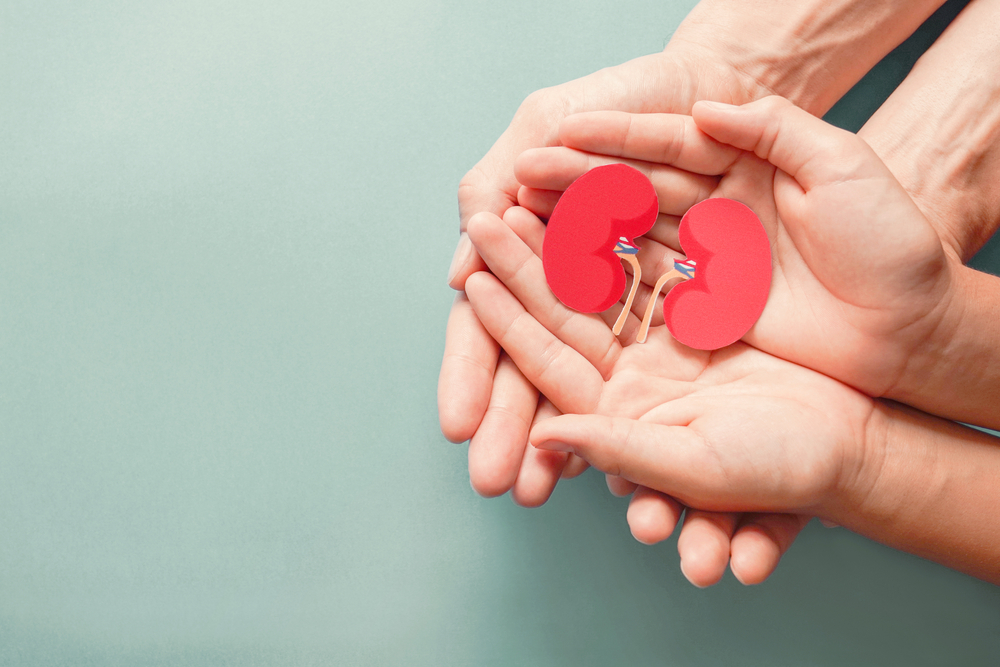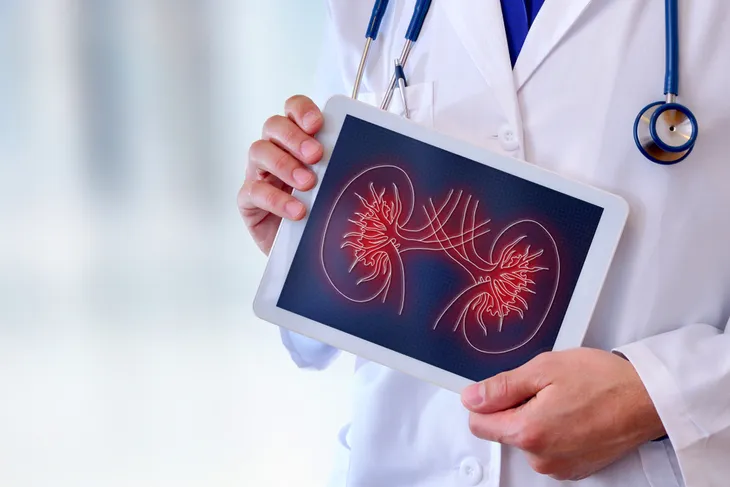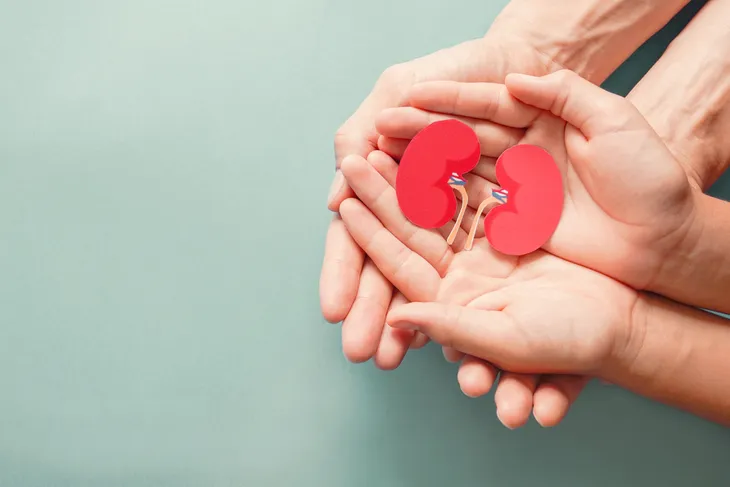- Kidney disease occurs when the kidneys are no longer able to filter your blood and clear waste the way they should.
- Studies have indicated that woman are more likely to experience chronic kidney disease than men.
- Kidney disease can be prevented by managing your health conditions and living a healthy lifestyle.
The kidneys have an important role in maintaining a healthy body. They help to filter waste and excess fluids from the blood, which are then removed through urine. If the kidneys are not functioning properly, this could be a sign of kidney disease.
Kidney disease, also known as renal disease, can affect your body’s ability to clean your blood, filter extra water and waste, and control your blood pressure, according to WebMD. Kidney disease can happen to anyone, but studies have indicated that it tends to impact women more than men. Follow along as we breakdown the relationship between women and kidney disease, as well as the risk factors, symptoms and solutions that may be helpful to know.
Function of the Kidneys
The kidneys play an important role in keeping your body healthy and free of waste and excess fluids. Kidneys are bean-shaped organs and you are born with two of them. The kidneys are located on either side of your spine, just above your waist.
Healthy kidneys assist your body in many ways to ensure it remains healthy. WebMD explains that healthy kidneys help to balance your blood’s water and mineral levels. They also help to remove waste from your blood after “digestion, muscle activity, and exposure to chemicals or medications.” Additionally, your kidneys produce renin, which your body uses to manage your blood pressure. Kidneys also produce a chemical called erythropoietin, which notifies your body to make red blood cells. Lastly, healthy kidneys produce an active form of vitamin D, which is essential for bone health, among other benefits.
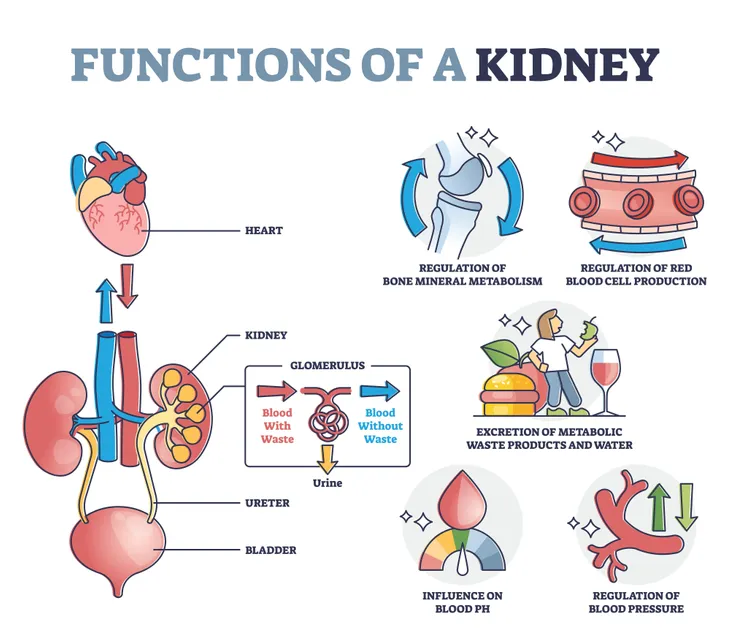 Shutterstock/VectorMine
Shutterstock/VectorMineWhat is Kidney Disease?
If your kidneys are not functioning properly, it may be a sign of kidney disease. The NIDDK explains that kidney disease signifies that your kidneys are damaged, which means they can’t filter blood and remove excess waste the way they should.
When the kidneys are damaged, it can lead to a buildup of waste products and fluid in the body, according to WebMD. This can cause reactions in the body such as weakness, swelling in the ankles, nausea, shortness of breath and difficulty sleeping.
Chronic vs. Acute Kidney Disease
Kidney disease can be either chronic or acute. If your kidneys suddenly stop functioning properly, doctors typically categorize this as acute kidney disease, according to WebMD. Acute kidney disease can have many causes including lack of blood flow to the kidneys, damage to the kidneys or urine backed up in the kidneys. It may also occur from traumatic injury, dehydration and certain medications.
WebMD explains that doctors categorize chronic kidney disease when the kidneys aren’t functioning properly for 3 months. Both types 1 and 2 diabetes and high blood pressure are common causes of kidney disease. High blood sugar levels can also cause kidney disease. Other conditions such as immune system disease, long lasting viruses and UTIs are other common conditions that can lead to chronic kidney disease.
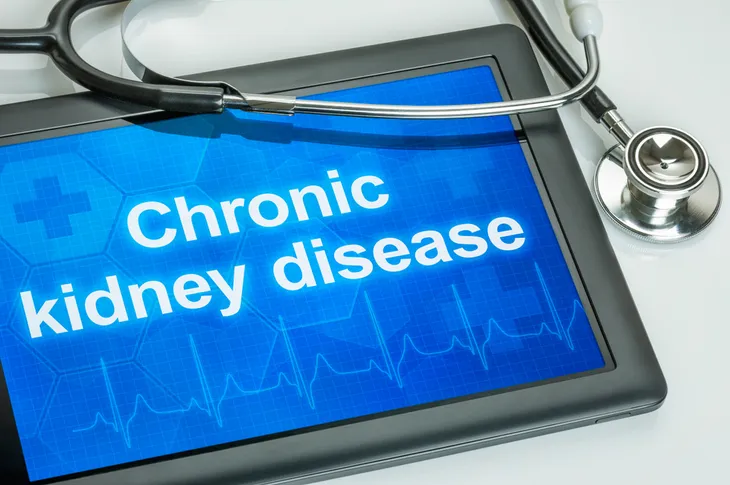 Shutterstock/Zerbor
Shutterstock/ZerborWomen and Kidney Disease
While it’s difficult to assess how prevalent kidney disease is in the global population, there are studies that indicate that it tends to impact women more than men. Johns Hopkins Medicine explains that the diagnosis of chronic kidney disease (CKD) is on the rise, especially for women.
Women who have been diagnosed with CKD may face other health issues as well. It’s common to experience irregular periods, sexual dysfunction, pregnancy complications, bone disease and depression alongside CKD.
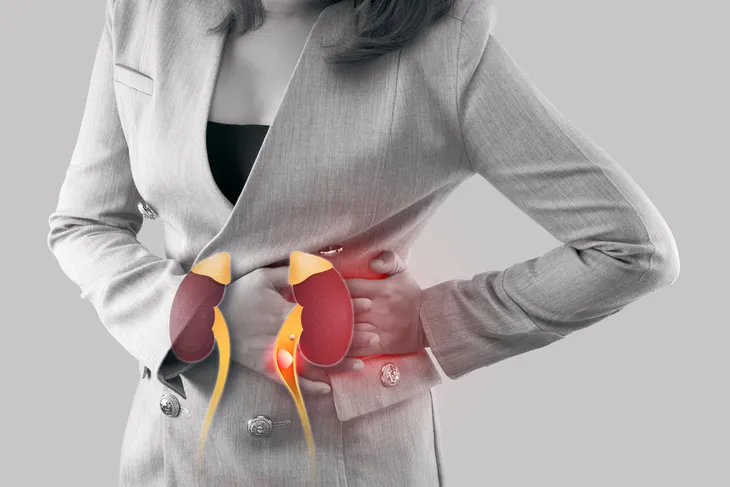 Shutterstock/Emily frost
Shutterstock/Emily frostCauses of Kidney Disease
Kidney disease can occur for a variety of reasons. Acute kidney disease is typically caused by sudden damage to the kidneys or infection. Some examples that could cause acute kidney disease include a traumatic injury, dehydration, severe infection, kidney stones, or pregnancy complications, among others.
Chronic kidney disease, on the other hand, typically occurs when another medical condition impairs the kidney function. Common diseases that typically cause chronic kidney disease include: type 1 or type 2 diabetes, high blood pressure, glomerulonephritis, polycystic kidney disease, prolonged obstruction of the urinary tract or recurrent kidney infection.
Risk Factors
Kidney disease is a complex condition that has many possible causes and risk factors. According to Siemens Health, a few primary risk factors for kidney disease include diabetes, hypertension, and cardiovascular disease. A family history of kidney disease, being over 60 years old, and being Black, Native American or Asian American are also common primary risk factors. Lastly, if you are a woman, it’s more likely that you may develop kidney disease.
Some secondary risk factors for kidney disease include autoimmune disease, urinary-tract infections, traumatic injury, infection, and kidney damage. Lifestyle may also effect the likelihood of kidney disease such as smoking, obesity, and an unhealthy diet.
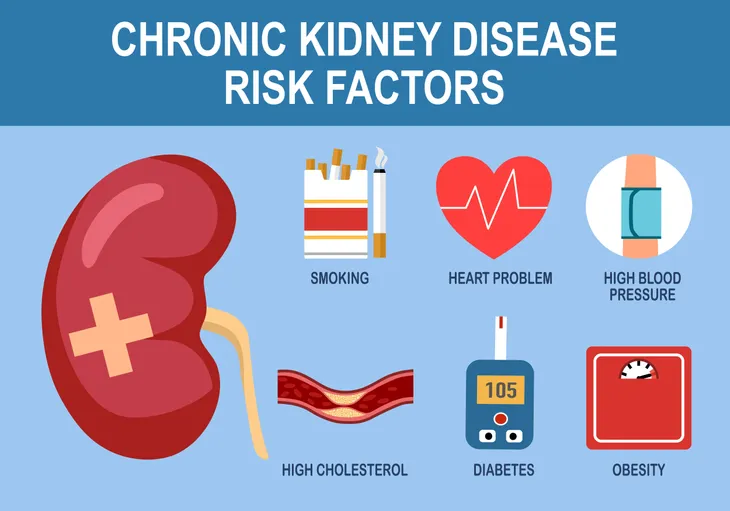 Shutterstock/Blueastro
Shutterstock/BlueastroSymptoms of Kidney Disease
WebMD explains that your kidneys are highly adaptable and can compensate even when issues are occurring. This is why symptoms often reveal themselves over time and many may not even feel symptoms until the disease is advanced.
Some symptoms of kidney disease include high blood pressure, nausea, vomiting, loss of appetite, feeling itchy, a metallic taste in mouth, swelling in feet and ankles, fatigue, weakness, difficulty concentrating, sleep issues, muscle twitches, shortness of breath and chest pain.
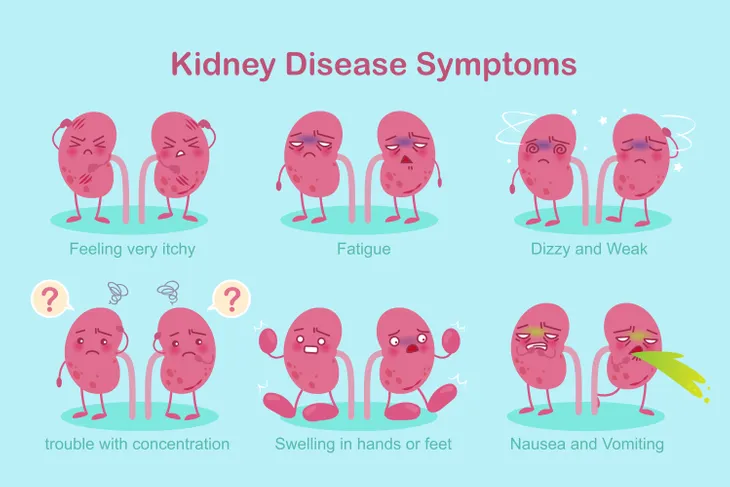 Shutterstock/EstherQueen999
Shutterstock/EstherQueen999Diagnosing Kidney Disease
If you suspect that you may have acute or chronic kidney disease, it’s important to contact a doctor for an official assessment. WebMD explains that your doctor will ask questions about your family history, which medications you are taking and about any symptoms you’ve noticed. The doctor will also likely perform a physical exam.
Your doctor may request a few other tests. They may request are a blood test to check how much waste product is in your blood or a urine test to check for kidney failure. They may also request an imaging test or a kidney biopsy to get a closer look at your kidneys to determine the issue.
 Shutterstock/Pixel-Shot
Shutterstock/Pixel-ShotStages of Chronic Kidney Disease
There are five stages of chronic kidney disease and your doctor will be able to assess which stage you fall under. Kidney Fund explains that the five stages of CKD indicate how well your kidneys are functioning. The early stages of kidney disease are stages 1-3. In theses stages, your kidneys are still able to filter waste out of your blood.
In the later stages of 4-5 your kidneys must work harder to filter your blood and may stop working altogether if you reach the point of kidney failure. The goal of each stage of chronic kidney disease is to slow down damage and keep your kidneys functioning effectively for as long as possible.
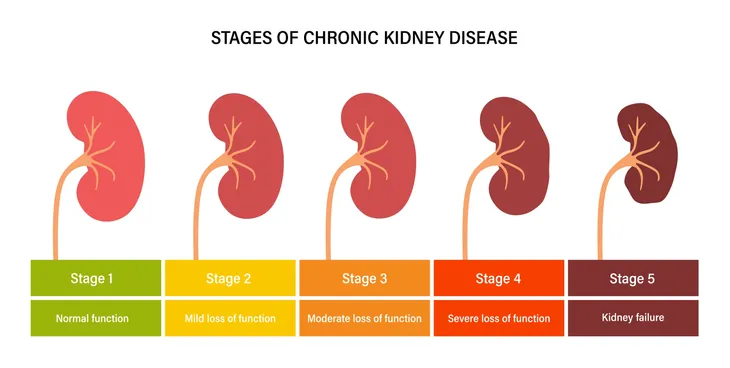 Shutterstock/Pikovit
Shutterstock/PikovitKidney Disease Treatment
Some forms of kidney disease are treatable with the goal of easing symptoms, lessening complications and preventing the disease from progressing, according to WebMD. While there is no cure for chronic kidney disease, there are treatment plans that can help to restore function.
MayoClinic explains that some treatment plans your doctor may consider are high blood pressure medications or medication to relieve swelling, treat anemia, lower cholesterol, and protect your bones. They may also suggest a lower protein diet to minimize waste in your blood. If you have reached end-stage kidney disease, your doctor may consider treating through dialysis or kidney transplant.
 Shutterstock/Shidlovski
Shutterstock/ShidlovskiHow to Manage Kidney Disease
There are many steps you can take to manage kidney disease, especially if you’ve been diagnosed with chronic kidney disease. The most important step you can take is to control your blood pressure, since high blood pressure can damage your kidneys. NIDDK explains that some tips to maintain a healthy blood pressure include “eating heart-healthy and low-sodium meals, quitting smoking, being active, getting enough sleep, and taking your medicines as prescribed.”
If you have diabetes, it’s important to check your blood glucose level regularly. These results can help to guide decisions about medication, diet and exercise. Your doctor may also want to perform regular tests to check in on your kidney function and track any changes.
 Shutterstock/Chinnapong
Shutterstock/ChinnapongKidney Disease Prevention
There are preventative steps you can take to keep your kidneys healthy. Since kidney disease is often linked to other conditions such as diabetes, high blood pressure and heart disease, it’s important to effectively manage these health conditions to avoid kidney damage.
Maintaining a healthy lifestyle is highly effective in preventing kidney disease, according to NIDDK. Lifestyle tips such as eating a well-rounded diet filled with fresh foods and low fat can prevent kidney disease as well as many other harmful conditions. It’s also recommended to make physical activity part of your daily routine, stop smoking, aim for a healthy weight, get enough sleep, limit alcohol intake and explore stress-reducing activities.
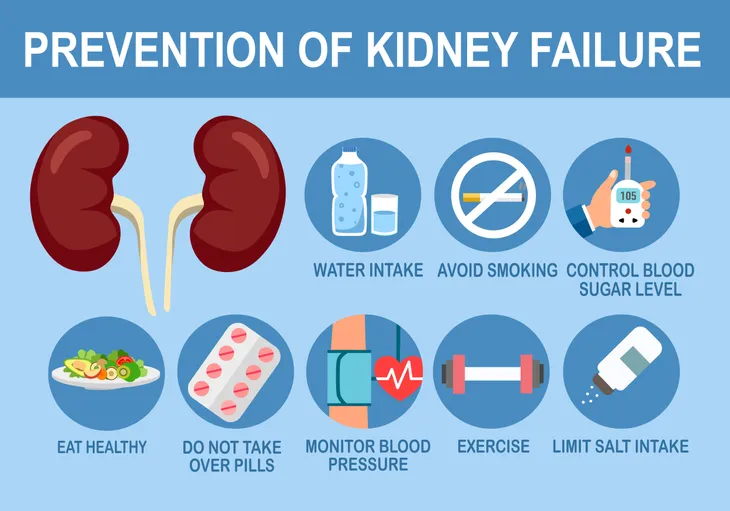 Shutterstock/Blueastro
Shutterstock/Blueastro